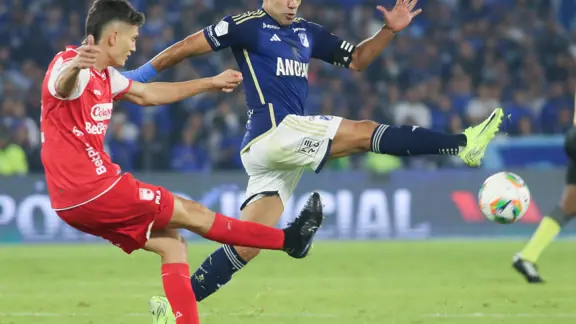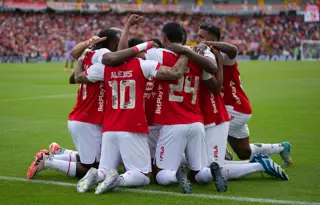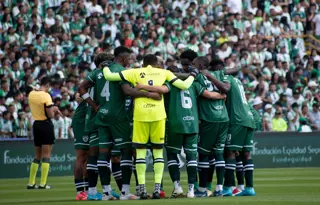News
Over 1,000 footballers in Colombia vote to strike

- More than 1,000 footballers in Colombia voted in assembly to exercise their right to strike
- The strike is in protest at the failure to reach an agreement with the Colombian Football Federation and the Dimayor League on nine crucial points
- Carlos Gonzalez Puche, executive director of Colombian player union ACOLFUTPRO, spoke to FIFPRO
In a decision voted by an overwhelming majority, footballers in Colombia decided to exercise their right to strike in protest at the failure to reach an agreement with the Colombian Football Federation and the league (Dimayor) on nine crucial points under discussion.
Colombian player union ACOLFUTPRO was leading the negotiations with the other two main stakeholders in Colombian football, as well as club representatives and with the intermediation of the Ministry of Labour. In January historic partial agreements had been reached for the benefit of footballers in Colombia, but the talks were due to continue in February on other sensitive items demanded by the union.
This second part of the negotiations did not sufficiently meet with ACOLFUTPRO requests, hence the decision to take a strike. A total of 1,221 footballers from the men's first division, the men's second division and the women's league voted in the assembly – 87.4 percent (1,067 votes) opted for strike action.
The decision received the support of FIFPRO President Sergio Marchi, through a letter sent to ACOLFUTPRO on Thursday in which he said that ‘the union and determination of footballers are key to building a fairer football with dignified conditions’.
The nine points on which there was no agreement are: players' statute, disciplinary code, single minutes, health policies, annual match of the Colombian national team, participation on TV rights, meetings with the footballers of the Colombian national team, match tickets and protocol against discrimination, harassment and gender violence.
FIFPRO spoke with Carlos Gonzalez Puche, executive director of Colombian player union ACOLFUTPRO, to learn more about the situation.
What is the situation at the moment?
We are waiting for the process to continue. This weekend's date is going to be played normally because the zero hour has not been decreed (editor’s note: the effective start date of the stoppage of activities). Colombian labour law establishes two working days to 10 working days after you inform the Ministry of Labour of the workers' decision. We took that step on Wednesday. For now, there has been no pressure because the date is going to be played, but the directors of the clubs are already calling, saying that it is unfair, that why won't it be played if they have the footballers, their workers, up to date with their salaries.
The problem is that in Colombia, negotiation by economic sector is not regulated and the clubs employ the players, but the Colombian Football Federation and Dimayor are the ones who establish the working conditions. So, the clubs argue that the federation and the league are not employers and will end up hurting them. But this is not a local problem for one team, it is a global issue. We negotiated for 10 months and reached the agreements that were made public at the time. But we didn't reach an agreement on all the points of the specifications.

And that's why they came to the point of voting in the Assembly.
We consulted the players and they decided this. Players from 36 men's and 16 women's clubs voted between the options of going on strike or going to arbitration. There were 52 in total in a triple day across the country, with virtual and face-to-face meetings. Footballers of the stature of Radamel Falcao, David Ospina and Juan Fernando Quintero voted. National team players who have spent many years abroad. It is very important to stress that this is a global issue, not a team issue.

Of the nine points still in dispute, which do you consider most important?
The players' statute is key for us because it is what regulates the activity, as there is no specific law for footballers here. This statute is fundamental. We have discussed the issue, but the problem is that there is no mechanism to prevent unilateral modifications. So, even if we can reach an agreement, they can change it whenever they want. Their argument is that legally they have that power. What kind of agreement is that? The federation argued that they had that power legally. So we said no, there would be no agreement if there was no mechanism to protect the players from unilateral changes.
The issue of the share of television rights is also important. They offered us just 20,000 Colombian pesos, about 5,000 dollars. We would use the income for our social fund, to maintain the educational programmes we have. Since 2020 we have given education to 697 footballers: 443 men’s players and 254 women’s players. The destination is the training of players who are studying and graduating, which naturally has its costs.
Another issue is that they give us the benefits of one match a year of the Colombian national team in order to build up a retirement fund. But they don't want to. We discussed this with Fernando Jaramillo, former president of Dimayor. We were able to negotiate with him, but he ended up being sacked by the president of the federation (Ramon Jesurun) and at the end of February he left his post.

What are the next steps?
Waiting. Another period is starting now. The strike has already been declared and we have a maximum of 10 working days until 26 March for the zero hour to be established. There are deadlines. So far, we have not been summoned to the Ministry of Labour. We will see what happens. The thing is that it has just blown up. This Thursday the national team made the call for the World Cup qualifiers. They are concentrating in Brasilia and play on Thursday against Brazil.
Are the negotiations with the federation and Dimayor still going on?
Negotiations came to a standstill because they left the table.
